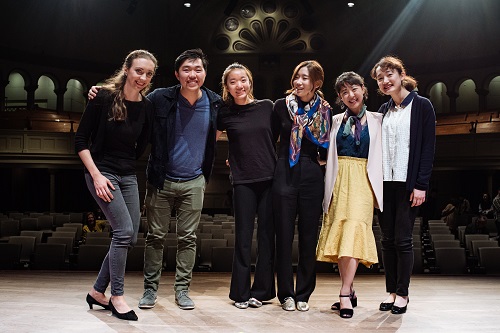 Canada Prokofiev, Sibelius, Brahms: Anna Lee (violin), Fumika Mohri (violin), Johanna Pichlmair (violin), Orchestre Symphonique de Montréal / Alexander Shelley (conductor). Maison Symphonique, Montréal. 5.6.2019. (LV)
Canada Prokofiev, Sibelius, Brahms: Anna Lee (violin), Fumika Mohri (violin), Johanna Pichlmair (violin), Orchestre Symphonique de Montréal / Alexander Shelley (conductor). Maison Symphonique, Montréal. 5.6.2019. (LV)

Elli Choi, Christine Lim, Anna Lee, & Fumika Mohri (c) Tam Lan Truong
Prokofiev – Violin Concerto No.2 Op.63
Sibelius – Violin Concerto Op.47
Brahms – Violin Concerto Op.77
Facing down five formidable competitors, violinist Hao Zhou was awarded First Prize at the 2019 Concours Musical International de Montréal.
One of four Americans in the final cut, the 22-year old performed Shostakovich’s First Violin Concerto the night before (review click here), and was both the audience and the jury favorite. Zhou’s win also paid tribute to the opportunities offered by the Southern California classical music community; he now studies at the Colburn School.
For the remaining performances on Wednesday night, Johanna Pichlmair from Austria took home second prize with Brahms, and Fumika Mohri from Japan took home the third with Sibelius.
On both nights, the competition from Zhou’s fellow Americans was fierce. On Tuesday, Elli Choi (the youngest contestant at 17) had played an unusually smooth and convincing Bartok Second; and Christine Lim (24), who will join the Philadelphia Orchestra’s second violins full-time in the fall, played an incandescent Sibelius which I still can’t forget.
On Wednesday, Anna Lee (23) channeled Prokofiev’s Concerto No.2 with a lovely, mature vision, letting the music flow through her in a chaste Prokofievian stream not entirely devoid of brilliant fireworks. A unison passage with the double basses was magical.
Winning second prize with Brahms, the 29-year-old Pichlmair from Austria faced the challenge of preparing repertoire and a soloist’s mentality for this competition, while being a permanent member of the first violins in the Bavarian Radio Symphony with its emphasis on teamwork. In Sibelius, Fumika Mohri (25) from Japan was hypnotically compelling, and offered a gorgeous low register. Some furious fiddling and a hard-driving cadenza emphasized her ability to project, and cut through anything.
Pichlmair’s Brahms began at a nice flowing speed. From the moment she entered she shaped passages wonderfully, was the only finalist who used portamento to any degree, and she had a way with trills that may have seduced even herself. After the chain of trills at the end of Joachim’s first movement cadenza, leading back to the final climax with the orchestra, she slowly passed her attention from the conductor to the audience, her face drained of emotion.
Despite her spontaneity, she followed conductor Alexander Shelley closely, and was clearly inspired by the marvelous, rapt playing of the ensemble. Responding to the reedy French woodwind solos and their phrasing and tone, she soared. In the last movement, she uncoiled an exhilarating, totally authentic luftpause, fought through a memory lapse, and transformed the insane triplets (in thirds) into full-throated song. When it was over, Pichlmair dashed off stage as if she were afraid the audience would stop applauding. They didn’t, and Shelley generously brought her back to shine in the spotlight with the orchestra.o
To the victors went the spoils. Zhou received $30,000 from the city of Montréal, the Joseph-Rouleau career development grant of $50,000 offered by the Azrieli Foundation, a violin and bow handmade by the Maker’s Forum valued at $20,000, an artist residency at Canada’s Banff Centre for the Arts, and a trip to Florence for the 2020 New Generation Festival. Confirming unofficial applause meter readings, Hao Zhou also took home the Radio-Canada Audience Award.
Pichlmair won $15,000 and Mohri $10,000. Anna Lee took home an award for the best performance of a sonata in the semi-finals, and Pichlmair was recognized for her performance of the compulsory Canadian work (Michael Oesterle’s 2019 opus, titled stand alone) and with the Montréal Bach Festival Award.
While putting on an inspiring and highly entertaining classical music show, the Concours also showed the value of allowing slightly older contestants to enter. For every Zhou at age 22, there was a Pichlmair at 29. After all, David Oistrakh won his game-changing Queen Elisabeth Competition at 29—two years after he lost to Ginette Neveu in the Wieniawski Competition.
Laurence Vittes